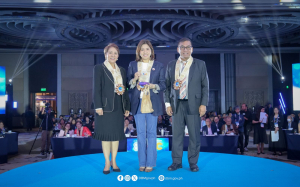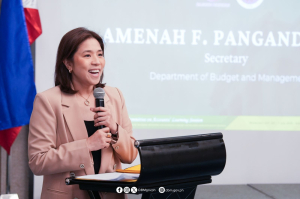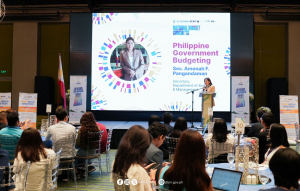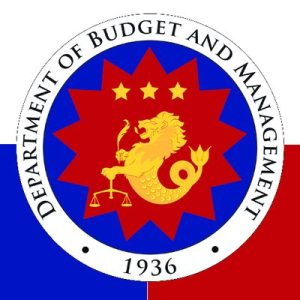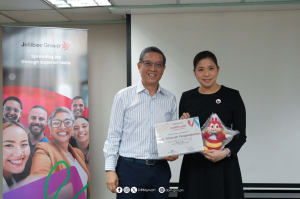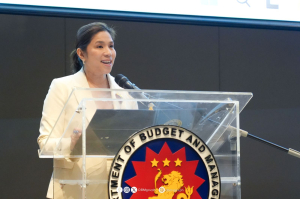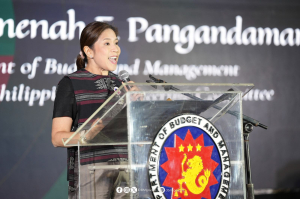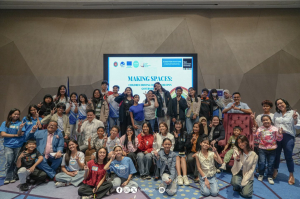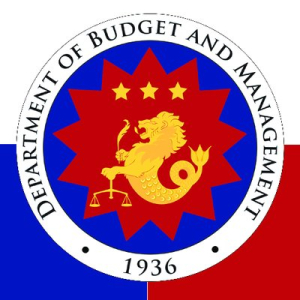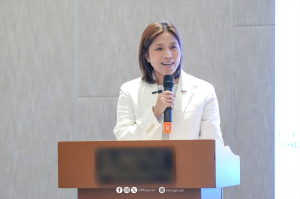
- Details

To Nueva Ecija Provincial Governor Aurelio Umali, Nueva Ecija University of Science and Technology (NEUST) President Dr. Feliciana Jacoba, and the NEUST community—maraming salamat po sa mainit na pagtanggap sa Department of Budget and Management;
To the Association of Local Budget Officers in Region III (ALBO III), Inc. headed by President Henry P. Tomas;
To my DBM colleagues, most especially to DBM-Regional Office III led by RD Rosalie Abesamis whose support has been invaluable to the success of this activity;
To our local budget officers and Public Financial Management (PFM) practitioners; and all our participants, magandang araw po.
Assalamu alaikum wa Raḥmatullahi wa Barakatuh.
Congratulations on being the first batch of the 2023 Public Financial Management Competency Program (PFMCP) for Local Government Units (LGUs).
This is also the first face-to-face PFMCP for LGUs this year! At nakakatuwa naman po na marami tayong participants para sa buena manong event na ito. Buena mano po ito so dapat maswerte po tayong lahat!
I would like to thank all of you for taking the time to participate in this event despite your busy schedules. I admire and commend your effort to improve yourselves through this program, your dedication to providing better quality public service, and your commitment to serving the people.
I have conversed with different PFM practitioners across the country, so I am aware of the many challenging situations and circumstances that you face at the local level.
Mula sa pakikipag-uusap natin sa iba’t ibang mga LGU ay nalaman natin na isa po sa inyong mga hiling ay magkaroon ng targeted at LGU-focused na PFM Competency Program. Kaya po nagsumikap kami na maisagawa ito, kasama po ng PHILLBO.
We specifically designed this training program for LGUs to deepen your knowledge on PFM with the end in mind of promoting good governance, financial accountability, and effective resource management in your respective localities.
That is why in the past two days, you were given updates and information under the Foundation and Budgeting Tracks; and today, you will learn about Government Procurement from our credible resource person, Atty. Maria Dionesia A. Rivera- Guillermo.
Importante po ang procurement. As we all know, procurement is one of the most crucial aspects of governance. In fact, we call it the heart of public service because it is through procurement activities that we are able to source materials to provide our fellow Filipinos with infrastructure, healthcare services, education materials, and more.
Hence, we are working very hard to improve our procurement systems to become future-ready, efficient, and, most of all, to ensure integrity in procurement processes. I am happy to share with you that just last week—September 20—we presented to the Legislative-Executive Development Advisory Council (LEDAC) Meeting led by no less than our President Ferdinand R. Marcos Jr. our proposed amendments to the 20-year-old Government Procurement Reform Act (GPRA). In fact, it was one of the priority bills included in the Common Legislative Agenda (CLA) of the 19th Congress to further advance the attainment of our social and economic transformation agenda.
These amendments include various strategies in procurement planning including market scoping, early procurement activities, and the use of framework agreements. We will likewise leverage digitalization and innovation to make public procurement more efficient and transparent through the modernized Philippine Government Electronic Procurement System (mPhilGEPS).
If all goes well, we will soon also have an electronic reverse auction and an electronic or e-marketplace which we will expand to not just common-use supplies but also non-common-use supplies. Ito po ay similar sa Shopee at Lazada so mas madali na po tayong mag-oorder ng supplies for our use in our offices.
We will also make our procurement systems go green! We will adopt a Green Public Procurement Strategy in the procurement of goods, infrastructure projects, and consulting services to ensure reduced environmental impact throughout their life cycle. In addition, we aim to integrate green practices and environmentally relevant criteria in the procurement design of a project, and effectively establish a local market for green products.
Most of all, because DBM is the head of the Open Government Steering Committee in the Philippines, we will make procurement transparent by mainstreaming public participation in our procurement process. We will be inviting at least two observers—from the private sector and the civil society—to sit in procurement proceedings. And, we will be the first country in the world to ensure equal access to information at ALL stages of our procurement process.
Marami pa pong ibang reporma sa procurement but I will let our abled resource speaker to go into details later.
Now on the budget, I am proud to share that the House of Representatives approved the Fiscal Year 2024 General Appropriations Bill on the third and final reading last Wednesday, September 27—wherein a total of Php 1.008 trillion or 17.5 percent will be allocated to the Local Government Units. And, this feat would not be possible without your support, our dear budget officers, as you play a crucial role in bridging the needs of our fellow Filipinos to the national government, making our PFM system responsive and people-centered.
Hence, we remain committed to continuing and even upscaling our efforts to provide you with more capacity-building and assistance in the future, as we update our PFM policies and guidelines to cope with the changing times and the evolving needs of our people.
I hope that through our capacity building, you will be inspired not only to work harder but also to help us implement the necessary reforms that will improve our government systems and processes.
I also hope that this PFM Competency Program will help you create and execute the necessary Programs, Activities, and Projects that will make your respective LGUs thrive because ultimately, that is the wisdom of the Mandanas-Garcia Supreme Court Ruling: to empower our LGUs to serve the people in your localities faster and better.
Sama sama po nating paigtingin at pagitingin ang ating mga LGU sa pamamagitan ng wasto at tapat na pagsasagawa at paggamit ng ating mga budget tungo sa Bagong Pilipinas. Together, let us secure a future-proof and sustainable economy and achieve our Agenda for Prosperity.
Mabuhay po ang Region III! Mabuhay po ang Nueva Ecija! Mabuhay ang Pilipino at ang Bagong Pilipinas.
Maraming salamat po.
Wabillahi Tawfiq Wal Hidaya, Wasalamu alaikum wa rahmatullahi wa Barakatuhu.
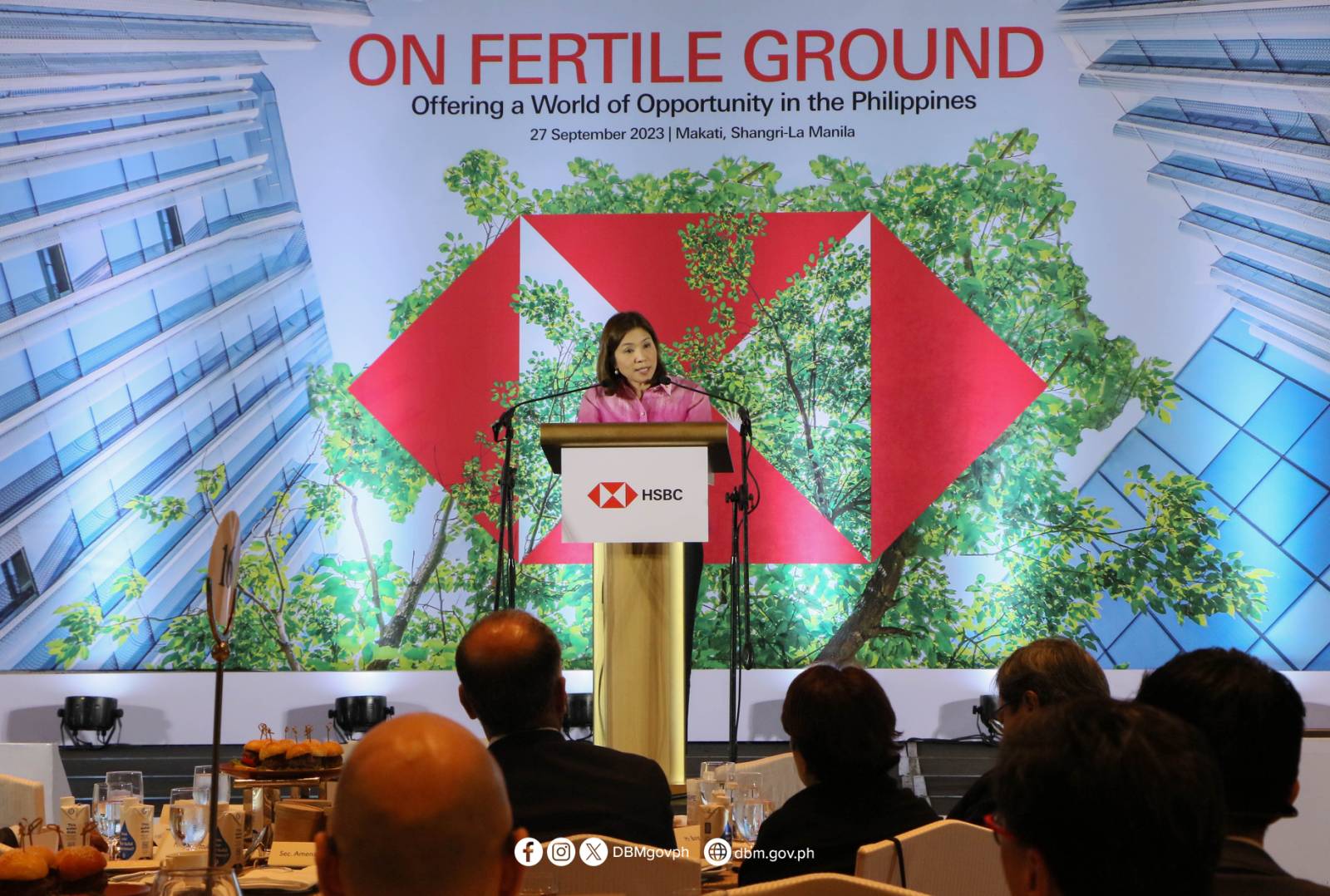
- Details

To our host, led by HSBC Asia Pacific Co-CEO Surendra Rosha and HSBC Philippines President & CEO Sandeep Uppal;
Distinguished leaders and members of the business community;
And to all participants of this flagship event, ladies and gentlemen, a pleasant afternoon to all.
Assalamu alaikum wa Raḥmatullahi wa Barakatuh.
First, I would like to thank HSBC Philippines for inviting the Department of Budget and Management to be part of this very promising conference that aims to explore the world of economic opportunities in the Philippines. We are likewise grateful to HSBC for being our partner and being part of the country’s growth story since 1875.
Today, I am eager to provide you with updates on the trajectory of the Philippine economy—which has become one of the fastest-growing emerging economies and investment hubs in Southeast Asia.
GDP Growth
Last year, the country registered its highest full-year growth in 46 years at 7.6 percent of GDP, even surpassing the government’s target for 2022.
For the first semester of this year, the economy continued to expand by 5.3 percent despite ongoing risks due to inflation and global uncertainties. This is much faster than other emerging Asian countries such as Indonesia, Malaysia, Vietnam, and Thailand.
Growth Projections
In fact, we have good reason to believe that near-term prospects for the Philippines remain upbeat as international financial institutions share our optimism.
Just recently, the Asian Development Bank affirmed that the Philippines’ growth story remains strong despite a forecasted 5.7 percent moderation in 2023 given strong domestic demand and robust infrastructure spending. This projection is also higher than the estimated growth of our neighboring countries such as Indonesia Malaysia , Singapore and Thailand.
The World Bank also expects the Philippines to achieve above-middle-income status by 2025 while S&P Global Market Intelligence forecast has declared that the Philippines is on its way to becoming a one-trillion-dollar economy in just a decade.
Credit Rating Updates
The Philippines also secured investment-grade credit rating from the top 3 rating agencies such as Moody’s, Fitch, and S&P Global. We even received upward revisions amid the expected global slowdown. And just last month, Japan-based debt watcher, Rating and Investment Information, Inc. (R&I) also affirmed our investor-grade credit rating at ‘BBB+’ and revised its outlook from 'stable' to 'positive' due to the country’s robust macroeconomic fundamentals and sound banking system, among other factors.
Medium-Term Fiscal Program
On the fiscal front, we remain on strong footing, guided by the Medium-Term Fiscal Framework. The MTFF serves as our economic blueprint in achieving fiscal stability.
As of end-July, total revenues reached Php 2.27 trillion, higher by 11.58 percent compared to collections for the same period in 2022. Government spending also started to pick up, increasing by 2.66 percent at Php 2.87 trillion. As a result of the higher revenue and expenditure outturn, the budget deficit dropped to Php 599.5 billion, 21.22 percent lower compared to last year’s level.
Over the medium term, revenues are also expected to increase annually by an average of 11.2 percent through revenue-generating measures and structural reforms. Government disbursements will be sustained above 20.0 percent of GDP on average, while the deficit will gradually decline to the pre-pandemic level of 3.0 percent of GDP by 2028.
Together with the rest of the economic team, we will closely monitor the developments on the international and domestic front and stand ready to make policy adjustments to ensure the attainment of our medium-term growth and fiscal targets.
FY 2023 National Budget
This year, our budget amounts to Php 5.268 trillion. It was carefully crafted to ensure social and economic transformation, aligned with the objectives and strategies of the 8-Point Socioeconomic Agenda, Medium-Term Fiscal Framework, and Philippine Development Plan 2023-2028.
To sustain the country’s high-growth and fiscal performance, the Department of Budget and Management has already released roughly 95.3 percent of the FY 2023 National Budget as of last August.
We have also directed all government agencies, especially those with low budget utilization rates to prepare and submit their spending catch-up plans to fast-track the implementation of their programs and projects for the rest of the year.
With sustainable and inclusive growth in mind, the Social Services sector—comprising Education, Social Protection, and Health—has been given the highest budget allocation with Php 2.0 trillion or 38.0 percent of the national budget. Meanwhile, the second highest share will go to the Economic Services sector with Php 1.62 trillion or 30.8 percent of the budget, as the government continues to push for infrastructure development.
FY 2023 Infrastructure Development
We are determined to maintain infrastructure spending at 5.0 to 6.0 percent of GDP over the medium term as set out in our MTFF. As such, infrastructure will be at the center of the administration’s growth strategy to create more and better jobs as likewise set out in our PDP Plan 2023-2028.
For this year, we have allocated 5.4 percent of GDP or 25.3 percent of the FY 2023 national budget for the Build-Better-More Infrastructure Program.
The bulk of the infrastructure budget for 2023 is intended for the development of physical connectivity infrastructure which includes the construction of road networks, railways, and flood control infrastructure. We have also ensured that we have significant allocations for social infrastructure such as school buildings, water supply systems, hospitals, and health centers.
Over the medium term, the government has already approved 197 high-impact infrastructure flagship projects (IFPs) on public road networks, tollways, green energy, water, agro-industrial ventures and telecommunications which have estimated high returns on investments and sizable socioeconomic impact. This has an indicative total investment of Php 8.71 trillion which will be financed through various means.
Public-Private Partnerships
Recognizing the important contributions of the private sector in steering economic growth, we are adopting diverse and innovative financing solutions to fund these infrastructure projects.
First, we will make strategic co-investments with the private sector through PPPs or Public-Private Partnerships. This will not only help boost financing but also harness advanced technical expertise for infrastructure development. Out of 197 Infrastructure Flagship Projects, we have 39 shovel-ready projects that will be undertaken through PPPs.
We are also proud to share that the PPP Act was recently approved. This will further simplify the evaluation process and create a unified system for investors to refer to when engaging in PPP projects. Ultimately, this shall establish a stable and predictable PPP policy environment to pave the way for high-quality and cost-effective infrastructure in the country.
FY 2023 Digitalization and CCET Budget
We are also keen on improving our digital infrastructure. We have provided Php 24.93 billion for the digital transformation of the bureaucracy under this year’s budget
Acknowledging the importance of sustainable economic growth, we have significantly increased the budget for climate change adaptation and mitigation measures by 60 percent. This includes investments in water sufficiency, renewable energy, and alternative resources.
FY 2024 National Budget
Looking ahead, the National Budget for FY 2024 will prioritize shovel-ready projects, investments in human capital development, sustainable agriculture and food security, and climate change adaptation and mitigation, among others. This will guarantee the continuity of gains from this year’s priority programs and contribute to securing a future-proof and sustainable economy.
To complement the implementation of these priority programs and strengthen our commitment to policy continuity, we have improved and introduced new structural reforms that promote sound fiscal management, digital transformation, and an open government. Let me cite some of these reforms.
Maharlika Investment Fund
First, as you know, we have successfully created the country’s first-ever Sovereign Development Fund through Republic Act No. 11954. Anchored on a development objective, the Maharlika Investment Fund will be utilized to generate optimal returns on investments, while contributing to job creation, poverty reduction, and sustainable economic development.
To hit the ground running, we have drafted the Implementing Rules and Regulations and opened the nominations and applications for the Board of Directors of the Maharlika Investment Corporation that will manage the MIF.
Economic Liberalization Reforms
We are also committed to further improving the country’s business environment through the implementation of economic liberalization reforms.
The landmark Corporate Recovery and Tax Incentives for Enterprises or CREATE Act introduced the largest fiscal stimulus for businesses in Philippine history. This lowered our corporate income tax rate, which used to be the highest in the region, to become comparable with our ASEAN peers.
We are also establishing a more favorable investment climate in the Philippines by welcoming greater foreign participation through the amended Public Service Act, Foreign Investments Act, and Retail Trade Liberalization Act.
The easing of foreign equity restrictions aims to attract more foreign investors, modernize several key sectors, improve public service delivery, and generate more quality jobs.
Open Government and Digitalization Reforms
Aside from being an attractive investment destination, the Philippines is also a prime mover in open government, with our transparency and digitization initiatives at the forefront of many of our reforms.
In fact, at the Open Government Partnership Global Summit held in Estonia last September 6 to 7, the Philippines was commended for institutionalizing the PH-OGP through Executive Order No. 31, s. 2023. This is a landmark Executive Order—a first since the OGP was founded in 2011 and unheard of in many countries—as it provides a solid legal framework to ensure that the open government principles of transparency and citizen participation are embedded in programs and policies at all levels and across national government agencies.
Several reforms and legislative measures that promote digitalization are also being pursued by the administration including the adoption of the Integrated Financial Management Information System (IFMIS), the relaunch of Project DIME or Digital Information for Monitoring and Evaluation, and the passage of the Progressive Budgeting for Better and Modernized (PBBM) Governance Bill which aims to strengthen the government’s accountability to the people through fiscal transparency and participatory reforms, as well as institutionalize the digitalization of the public financial management (PFM) system.
Procurement Reforms and Open Government Contracting
Moreover, the DBM is also advocating for amendments to the decades-old Government Procurement Reform Act (GPRA) which will digitalize and streamline the procurement process while paving the way for a greener, more sustainable, transparent, and participatory procurement process.
Just last week, we presented the proposed GPRA amendments to the Legislative-Executive Development Advisory Council (LEDAC) led by no less than our president, President Ferdinand R. Marcos Jr. It was then certified as one of the priority bills included in the Common Legislative Agenda (CLA) of the 19th Congress to further advance the attainment of our social and economic transformation agenda.
One of the proposed amendments is the establishment of the electronic Marketplace or eMarketplace which aims to do away with the long, tedious government procurement process that has caused delays in the government’s delivery of products and services.
Closing
These are just some of the programs, policy directions, and reforms that the current Administration is working on to achieve our economic transformation.
But through the help of our partners in prosperity such as HSBC and all of you leading corporations in the business community, I am confident that we can achieve our medium-term objective of becoming an upper-middle-income country by 2028 if not sooner! Onwards towards BAGONG PILIPINAS—a Philippines of new and better opportunities—that we are all aspiring for.
So TOGETHER, let us OPEN UP A WORLD OF OPPORTUNITY and make the Philippines an investment destination—that we may concretize our goal of securing a future-proof and sustainable economy, not only for the Filipinos of today but also for the future generations.
Thank you very much. Wabillahi Tawfiq Wal Hidaya, Wasalamu alaikum wa rahmatullahi wa Barakatuhu.

- Details

To World Bank Country Director Ndiame Diop and Senior Procurement Specialist & Hub Coordinator Dominick Aumentado; Asian Development Bank Procurement Directors Rustam Abdukayumov and Jefrrey Taylor; Commission on Audit Assistant Commissioner Atty. Roy Ursal; fellow public servants, guests, ladies and gentlemen:
Assalamu alaikum wa Raḥmatullahi wa Barakatuh.
Good morning.
First, allow me to thank the World Bank and the Asian Development Bank for working alongside the Government Procurement Policy Board (GPPB) in the assessment of the Philippine Public Procurement System using the 2018 updated MAPS—an important tool for evaluating the government procurement performance of a country.
It is also remarkable that the MAPS assessment proper was actually carried out during the height of the COVID-19 pandemic from January to November 2021. Fast forward to June 2023, the MAPS Final Assessment Report was published and issued the Seal of Approval.
And this couldn’t have been more timely as we have just presented to the Legislative-Executive Development Advisory Council (LEDAC) Meeting led by no less than our president, President Ferdinand R. Marcos Jr. last week, our proposed amendments to our 20-year-old Procurement Law. In fact, it was one of the priority bills included in the Common Legislative Agenda (CLA) of the 19th Congress to further advance the attainment of our social and economic transformation agenda.
As you know, Republic Act No. 9184, or the landmark Government Procurement Reform Act (GPRA), authored by the late Senate President Edgardo J. Angara—I was a young researcher during that time in his office—and enacted on January 10, 2003, was envisioned to address the lack of transparency and competition, eliminate collusion and political interference, and lessen delays in the procurement process.
GPRA was one of the biggest anti-corruption laws in the country which was, in fact, recognized by no less than the World Bank as world-class legislation.
However, there has already been rapid transformation in technology over the past two decades, and the pandemic not only propelled the urgency for digital transactions in the country but also brought to light inefficiencies in the law in times of crisis. Even PBBM said during his latest State of the Nation Address that we need to make government procurement more attuned to our changing times.
And so we commit to making the revised GPRA with its amendments as monumental and word-class as its predecessor.
Aside from adhering to international standards, our proposed amendments to the GPRA are aligned with the Key Areas for Improvement and Recommendations in the MAPS Report.
These proposed amendments will ensure a “fit-for-purpose” concept or “appropriateness” in the adoption of procurement modalities and address procurement challenges experienced on the ground.
We likewise recognize that one of the main pain points in public procurement is the lack of proper planning. This has resulted in gross inefficiency caused by failed biddings and poorly crafted technical specifications or requirements.
To bridge this gap, our proposed amendments intend to introduce various strategies in procurement planning including market scoping, early procurement activities, engagement of a procurement agent, and the use of framework agreements to expand the pool of prospective bidders, take advantage of economies of scale, minimize the burden of conducting separate procurement activities, and generate time and money savings.
We will likewise leverage digitalization and innovation to make public procurement more efficient and transparent through the modernized Philippine Government Electronic Procurement System (mPhilGEPS).
We will also soon have an electronic reverse auction and an electronic or e-marketplace which we will expand to not just common-use supplies but also non-common-use supplies.
And because sustainability is one of my advocacies and a commitment of this Administration, we will adopt a Green Public Procurement Strategy to procure goods, infrastructure projects, and consulting services with reduced environmental impact throughout their life cycle. We will also integrate green practices and environmentally relevant criteria in the procurement design of a project.
Meanwhile, in constant pursuit of fiscal transparency and accountability towards an open government, we will also mainstream public participation in the procurement process by inviting at least two observers—one from the private sector and one from the civil society—to sit in procurement proceedings, ensuring equal access to information at all stages of the procurement process.
We actually presented our game-changing reforms during the Open Government Global Summit last month in Tallinn, Estonia. And we were the only ASEAN member representative among anti-corruption champions in the high-level roundtable discussion on “Sustaining Leadership and Catalyzing Global Action on Anti-corruption.”
Finally, as also cited in the MAPS Report, we recognize the need to establish an enabling environment for the professionalization of the procurement function. To address this, we will strengthen the institutional framework of the GPPB and GPPB-TSO to align its organizational structure and staffing with the technical and administrative support needed to implement all procurement reforms.
While the GPRA is an exemplary law, our society has changed drastically since its enactment 20 years ago. As such, it is no longer only beneficial but imperative for us to utilize the latest social and technological developments that we can use to meet the law's noble objectives.
As we all work hard to reinforce accountability and credibility in our procurement system, let us now take it to the next level with our digitalization and sustainability efforts so that we will remain on track with our Agenda for Prosperity—one where the government is trusted by the very people it has sworn to serve.
And we hope that the World Bank, the Asian Development Bank, and all our partners in prosperity will continue to stand with us and help us create a public procurement system that is truly inclusive, sustainable, reliable, and transparent—one that we can proudly put at the heart of delivering public services.
Thank you. Wabillahi Tawfiq Wal Hidaya, Wasalamu alaikum wa rahmatullahi wa Barakatuhu.
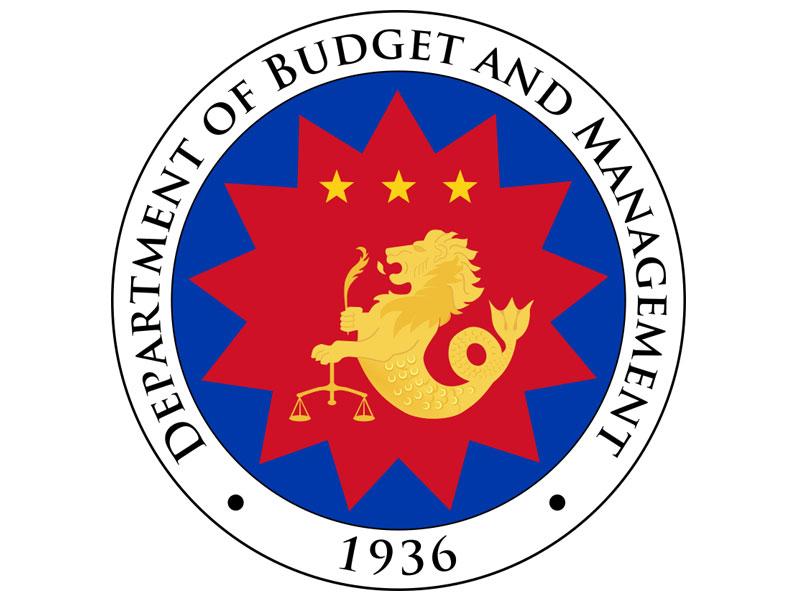
- Details
My heartfelt greetings to our fellow champions and advocates of open government and good governance, especially to our partners from Civil Society Organizations!
Assalamu alaikum wa Raḥmatullahi wa Barakatuh.
Welcome to the 6th Philippine Open Government (PH-OGP) National Action Plan Development Workshop.
As we all know, we have been preparing action plans to pursue increased and better participation in OGP. These action plans are the product of a co-creation process in which government and civil society jointly develop commitments to open government reforms.
Successful OGP action plans focus on significant domestic open government priorities and ambitious reforms. These are relevant to the values of transparency, accountability, and public participation, and contain specific, time-bound, and verifiable commitments.
But in all of these, I believe that the key to the success of our action plans and unlocking the future of open government is YOU—our partners from civil society. Through OGP, you strengthen the power that you hold in shaping our country’s open government agenda.
As a matter of fact, the new OGP Strategy 2023 to 2028 has highlighted that there can be no open government without a free civil society and that OGP is an “equal partnership between the government and civil society.”
Tayo po ay magkapantay at magkaagapay sa layuning maging bukas ang ating bukas. Buksan natin ang pinto sa isa't isa upang sama-sama nating mapaunlad ang ating bansa dahil tayo po ay mas malakas kapag tayo ay nagkakaisa.
It is for this reason that I would like to commend all of you for your enthusiastic participation in this undertaking. Together with your government counterparts, you have made significant steps in laying the foundation for open governance in the Philippines. And as we embark on the second phase of the co-creation process of our 6th National Action Plan, I hope that you will continue to do so through this National Action Plan Development Workshop and beyond.
More importantly, I call on you, our dear participants, to seize this opportunity to push for accountability in our government, amplify our collective impact in driving change, sharpen the narrative by bringing our open government reforms and initiatives closer to the people, and finally take up space and create space for our fellow Filipinos.
Let us make this workshop as fruitful and as purposeful as can be so that together, we can transcend beyond action plans and execute, monitor, and evaluate our programs and projects that genuinely open the government to the people.
Maraming salamat po. Mabuhay ang OGP at bawat Pilipino!
Wabillahi Tawfiq Wal Hidaya, Wasalamu alaikum wa rahmatullahi wa Barakatuhu.

- Details

Members of the economic team, distinguished guests, ladies and gentlemen:
Assalamu alaikum wa Raḥmatullahi wa Barakatuh.
First, I would like to thank the Philippine Embassy and our partner banks and institutions for giving us this opportunity to share the latest developments in the country's economic performance and investment opportunities, and on our end at the Department of Budget and Management, to highlight our Priority Expenditures.
To give you an overview, the National Budget of the Philippines for Fiscal Year 2023 amounts to Php 5.268 trillion or USD 94.1 billion. It is higher by 4.9 percent than our budget in 2022 and is equivalent to 21.9 percent of our GDP.
We want to ensure that our economic transformation is inclusive. Hence, the highest budget allocation has been provided for the Social Services sector—comprising Education and Health—equivalent to USD 35.7 billion or roughly 38.0 percent of our national budget.
In the Philippines, no less than the Constitution mandates that Education be given the highest budgetary priority. Hence, we have allocated USD 16.0 billion for Education.
While we maintain Social Services as a top priority, we are also committed to our Medium-Term Fiscal Framework. Hence, the Economic Services sector has been given the second highest share in the budget with USD 28.9 billion or 30.8 percent of the General Appropriations Act of 2023.
We have also embarked on an ambitious infrastructure development program called the Build-Better-More that aims to maintain infrastructure spending at 5 to 6 percent of GDP. For 2023 alone, we allocated USD 23.7 billion or roughly 25.0 percent of the national budget and is equivalent to 5.3 percent of GDP.
The bulk of this infrastructure budget is intended for the development of physical infrastructure aimed at improving physical connectivity throughout the country. Significant budgetary support was also provided for social infrastructure, which includes the construction of school buildings, hospitals, water and power supply systems, as well as housing and community facilities. To ensure that the Philippines becomes a viable investment destination, we are keen on improving our digital infrastructure. Some USD 445.0 million was allocated to accelerate the country’s digital transformation.
Amidst all this, we want our economic growth to be sustainable. Hence, climate actions have been mainstreamed and institutionalized in our development plan and the National Budget. This resulted in a significant increase in the budget for climate change adaptation and mitigation measures by about 60 percent compared to the previous year’s allocation.
We also want to ensure inclusivity and are keen to uplift Muslim Mindanao. A total of USD 1.33 billion has therefore been allocated for the Bangsamoro Autonomous Region in Muslim Mindanao, or BARMM, as its government undergoes transition until 2025.
Looking ahead, the National Budget for Fiscal Year 2024, which is already undergoing congressional scrutiny as we speak, will prioritize shovel-ready projects, investments in human capital development, sustainable agriculture and food security, and climate change adaptation and mitigation, among others. This will guarantee the continuity of gains from this year’s priority programs and contribute to securing a future-proof and sustainable economy.
Towards this end, some USD 9.69 billion has been earmarked for our FY 2024 proposed budget for climate expenditures. This will prioritize funding for Water Sufficiency projects, Sustainable Energy, Food Security, Knowledge and Capacity Development, and Climate-Smart Industries and Services.
Towards expanding our fiscal space and meeting our fiscal targets, we have initiated a couple of reforms.
Last June, the President issued Executive Order No. 29 directing the full adoption of the Integrated Financial Management Information System in government agencies to ensure the efficient delivery of quality services to the public.
We also hope to soon pass the Progressive Budgeting for Better and Modernized Governance Bill, which will institutionalize Public Financial Management reforms such as the Cash Budgeting System and further strengthen our efforts toward enhanced bureaucratic efficiency.
We are also overhauling our 20-year-old procurement law, which will ensure equal access to information at all stages of the procurement process. And, for sustainability, we are pursuing a Green Public Procurement Roadmap wherein the government will procure common-use supplies and equipment items with green specifications.
Moreover, we have also secured a momentous win for open governance in the country with the signing of Executive Order No. 31 institutionalizing the Philippine Open Government Partnership or the PH-OGP. In fact, before flying here, I was just in Tallinn, Estonia for the Open Government Partnership Global Summit where we presented the Philippines' reforms towards open government such as open contracting and the digitalization of the bureaucracy.
Finally, we have our very first Sovereign Development Fund, which is envisioned for the Philippines' economic development through strategic and profitable investments in infrastructure and other key sectors.
As you can see, we are working very hard to make the Philippines a top investment destination and uplift the lives of our people and future generations. The United Arab Emirates is very special to us. You have been so generous to our country over the decades. You provided humanitarian assistance during the Typhoon Haiyan, in 2020 when the Taal Volcano erupted, and some RT-PCRs during the Pandemic. This time, please be with us not just in crises or disasters, but in our economic growth journey. We invite you to be our partner in prosperity and we will make sure that your time and experience will be worthwhile.
Thank you very much.
Maraming salamat po at Mabuhay.
Wabillahi Tawfiq Wal Hidaya, Wasalamu alaikum wa rahmatullahi wa Barakatuhu.
More Articles …
- LAYING THE GROUNDWORK FOR A SUSTAINABLE FUTURE: Priority Expenditures Supporting the Philippine Development Plan
- Revitalizing Democracy Through A Whole-of-Open-Government Approach
- Putting Sound Procurement at the Heart of Delivering Public Services
- Taking Greater Strides Towards Open Government Through Digital Transformation
